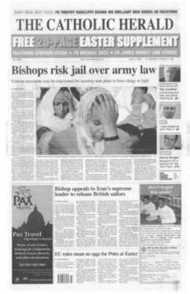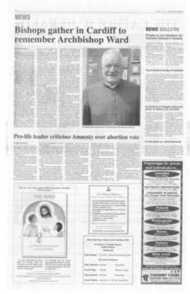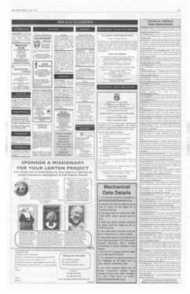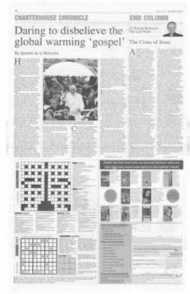Page 3, 6th April 2007
Page 3

Report an error
Noticed an error on this page?If you've noticed an error in this article please click here to report it.
Tags
Share
Related articles
Mps To Defy Courts Over Rulings On Euthanasia
Archbishop’s Letter Scuppers Rebellion
Passed Over For Promotion Or Completely Excluded In The...
The Law Will Force Doctors To End Lives, Not Save Them
Church At Odds With Doctors Over Suicide Case
Christian doctors vow to defy living wills requesting death
BY STAFF REPORTER
CHRISTIAN DocroRs have said they would rather go to jail than obey instruction to kill their patients.
They are threatening to defy new "backdoor euthanasia" laws that would force them to starve and dehydrate their patients to death.
Some have said they would ignore the Mental Capacity Act which came into force last weekend.
The Act allows terminally ill patients to instruct doctors that they wish to refuse food and fluid — classified as treatment — if their condition worsens. They cannot, however, request to be kept alive.
The protests against the legislation suggest that a significant section of the medical profession has grave doubts about the shake-up and its impact on the desperately ill, according to the Daily Mail newspaper.
The Act will give legally binding force for the first time to advance directives — or "living wills" — under which patients can set down their wish to refuse treatment if they become seriously or terminally ill.
In a living will, a patient can tell doctors to withdraw treatment so that they die as a result.
During the passage of the Bill through Parliament the Government insisted that the practice did not amount to euthanasia. But some doctors insist that if they deliber ately withheld food and fluid from a person who would not otherwise die they would be complicit in "euthanasia by omission" or assisting in a suicide.
Doctors must get a second opinion before deciding to withdraw artificial nutrition and hydration from a patient who is not close to death. There are also new provisions for patients to give "lasting powers of attorney" to a friend or relative. This "attorney" would be able to instruct doctors to let the patient die if they became incapacitated. Those refusing to obey the instructions would be open to prosecution for assault.
Doctors or nurses could also be accused of "wilfully neglecting" incapacitated patients and punished with up to five years in jail.
Dr Peter Saunders of the Christian Medical Fellowship, which represents 4,500 medics, said: "I know a number of doctors who will not stand by and allow their patients to die and who will risk criminal prosecution."
He said the Act was dangerous to incapacitated patients who were not dying and added: "Decisions about incapacitated patients are always more complex when there is money involved. Where there's a will there are relatives waiting."
Dr Philip Howard, a London gastroenterology consultant and a Catholic, said that he would not withdraw or withhold nutrition and hydration even when it was specified in an advance decision.
"No patient should die as a result of dehydration and no patient should be allowed to die in a state of unrelieved thirst," he insisted. "It is my practice never to allow a patient to die of unremitting thirst."
Dr Howard added that a number of his colleagues had made clear "deep concern that patients may be dehydrated at the end of their lives".
Consultant psychiatrist Dr Adrian Treloar, also a Catholic, said: "If I am asked, will I kill a patient under the Mental Capacity Act? the answer is `no'. People who make living wills or support the idea should ask themselves if they really want a doctor to stop treating them or would they rely on that doctor risking a jail sentence?"
The British Medical Association has issued guidance to doctors confirming it remains their duty to provide basic care— whatever directions about refusal of treatment are contained in advance decisions.
A spokesman said: "Basic care will always be provided and that means providing water, or moistening the mouth where swallowing is not possible, unless the patient says they don't want to drink."
The timetable for putting the law into action means advance decisions will become legally binding from October, when patients will also be able to give life-and-death powers to relatives, lawyers or social workers appointed by them as a welfare attorney.
Among those people who fear the new legislation is former postman Leslie Burke, 47, who has waged a lengthy legal battle to stop doctors from killing him.
Mr Burke is terminally ill with a degenerative brain condition that means he will eventually spend his final days in hospital.
His greatest fear is that he may suffer death by starvation or dehydration after he loses the power to speak for himself.
blog comments powered by Disqus



















